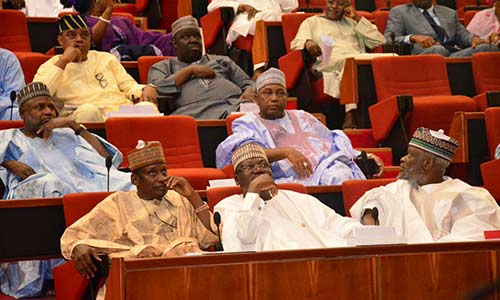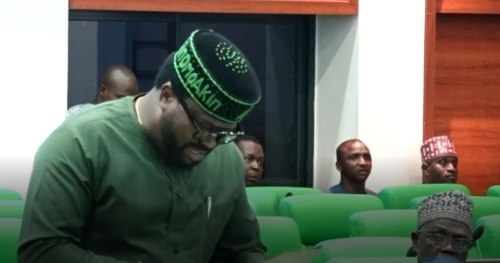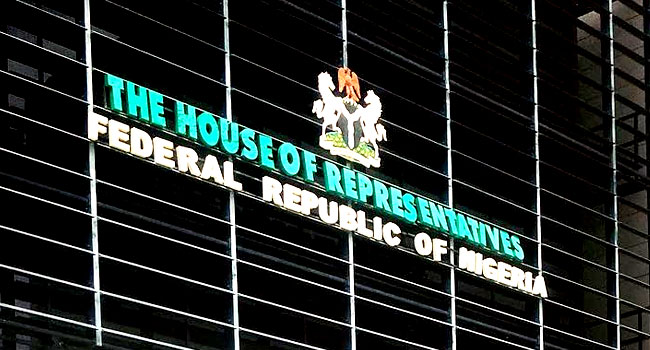Senate Urges CBN to Adjust Cash Withdrawal Limit

The Senate yesterday urged the Central Bank of Nigeria (CBN) to considerably adjust its recent cash withdrawal limit policy in response to public outcry against the move.
The upper chamber also mandated its Committee on Banking, Insurance and Other Financial Institutions to “continue to embark on aggressive oversight of the (apex) Bank on its commitment to flexible adjustment of the withdrawal limit and periodically report outcome to the Senate.”
The Senate also resolved to “support the CBN in the continuous implementation of transformational payments and financial industry initiatives in line with its mandate in accordance with the CBN Act.”
These resolutions of the Senate followed its consideration and approval of the recommendations contained in a report by its Committee on Banks, Insurance and other Financial Institutions on the recent cash withdrawal limit of the CBN.
The Senate also approved the nomination of a Deputy Governor of the Central Bank of Nigeria (CBN) on Financial System Stability, Mrs Aishat Ndanusa Ahmad for reappointment.
The upper chamber also cleared a Deputy Governor Corporate Services of the apex bank, Edward Lametek Adamu, for reappointment.
President Muhammadu Buhari had last week Tuesday forwarded the names of Ahmad and Adamu for screening and confirmation for reappointment for the second and final terms to the Senate.
The CBN had under its revised cash withdrawal limits placed a limit on cash withdrawals to N20,000 daily for Point Of Sale terminals; N100,000 weekly for private individuals and N500,000 for organisations and corporate bodies weekly, respectively.
However, the policy has continued to face criticism from a cross-section of Nigerians who believe that it is not only “punitive” but “unsustainable.”
The apex bank had said the move would help curb inflation, insecurity and corruption apart from having a beneficial effect on the nation’s economy.
Some Senators, in their contribution to the debate on the policy opposed the policy while others supported it.
Senators Yusuf Abubakar Yusuf, Francis Ailimikhena and Biobarakuma Degi-Eremienyo supported the policy and called on Nigerians to allow it to thrive.
However, Senators Orji Kalu, Ajibola Basiru, Adamu Aliero, Muhammad Adamu Bulkachuwa, Biodun Olujimi, Hassan Hadejia, Chukwuka Utazi, Stella Oduah, Francis Fadahunsi and Kabir Barkiya, among others, opposed the policy.
Some of them argued that even though the policy is targeted at the elites, it would have detrimental effect on the rural populace.
They insisted that the timing of the policy was wrong in view of upcoming general elections and the quantum of money needed by candidates for logistics during campaigns.
The Chairman of the Committee, Senator Uba Sani (APC – Kaduna Central), had during his presentation argued that the planned Cash Withdrawal Limit Policy was well conceived by the CBN for transformation of the Nation’s economy and that the action fell within the mandate of the apex bank as provided for in section 2(d) and 47 of its extant Act.
However during general debate on the report its recommendations many of the Senators kicked against the timing of the policy, warning that it may lead to mass revolt in the rural areas across the country.
First to oppose the apex bank’s move was Senator Ajibola Basiru (APC – Osun Central), who said the stipulated N100,000 and N500, 000 withdrawal per week for individuals and corporate bodies respectively, were unrealistic.
“Laws are made for people and not the people for the law. If CBN is acting under section 2(d) and 47 of its extant Act to make life difficult for Nigerians through a policy, as representatives of the people we need to intervene.
“Such intervention would be to make the CBN realise that the proposed cash withdrawal limit policy is unrealistic and very injurious and detrimental to the well-being of rural dwellers, many of whom are our constituents.
“The report of this committee recommending the policy to us and by extension, to Nigerians through suggestion of flexibility in implementation, is vague, nebulous and means nothing,” he said.
Senator Adamu Aliero (PDP – Kebbi Central), in his own contribution, said the picture painted by the committee in its report on the proposed CBN policy, was nothing but an ideal picture of what an economy should be, which is far cry from what economy is, in reality in Nigeria.
“The proposed CBN policy does not capture the informal sector and it is very detrimental to the livelihood of rural dwellers who are not into e-banking.
“Public outcry against the policy is too much, requiring serious caution as far as implementation is concerned because the Nigerian economy is predominantly rural,” he said.
Senator Adamu Bulkachuwa (PDP – Bauchi North), warned that the proposed policy, if not suspended, may trigger a revolt from rural dwellers.
He said the three recommendations made by the Senate Committee on Banking on the policy , made no sense to him.
“Our committee recommendations on the proposed CBN policy, are nothing but trying to put wool in the eyes of Nigerians,” he said.
Even Senator Orji Uzor Kalu (APC- Abia North), who is the deputy chairman of the
Committee on Banking, said he appended his signature to the report because he did not want to rock the boat.
He said: N100, 000 per week for individuals and N500,000 per week for corporate bodies, is too meagre.
“I recommend N500, 000 per day for individuals and N3 million per day for corporate bodies as being implemented in Abia, Lagos, Ogun, Rivers, FCT, etc, should be sustained across the country for now,” he said.
Senators Olujimi (PDP, – Ekiti South) and Francis Fadahunsi (PDP, Osun) kicked against the timing of the policy and called for massive enlightenment of Nigerians.
“The policy seems to be targeted at the elite who often devise means to circumvent the law. But it will affect millions of Nigerians in the rural areas,” Fadahunsi said.
Stella Oduah (PDP, Anambra) who described it as draconian, said: “Many rural communities in Nigeria have no internet networks. Without necessary infrastructure put in place, the policy will create more trouble,” Oduah said.



